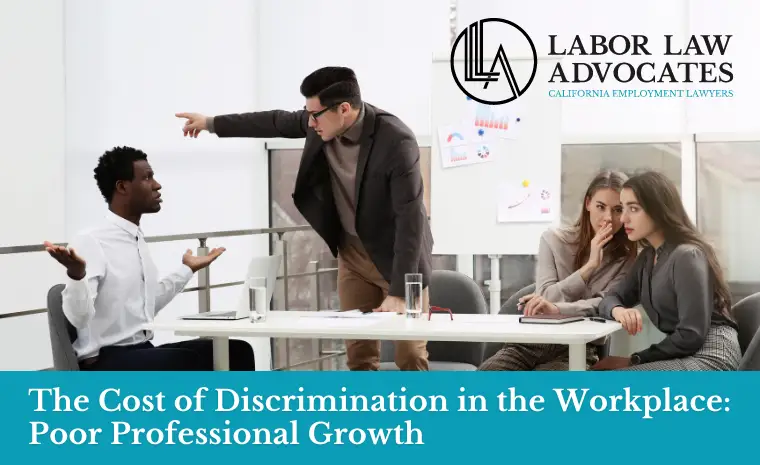Employment discrimination can have significant negative effects on the professional path of an employee. When an individual experiences discrimination in the workplace, they may face obstacles to gaining promotions, salary increases, and other employment opportunities for advancement.
Discrimination in the workplace refers to any unfair treatment of an individual or group of individuals based on their race, gender identity, age, religious beliefs, sexual orientation, marital status, physical disability or mental disability, and other protected characteristics.
One of the most immediate effects of intentional discrimination is that it can lead to a lack of job satisfaction and decreased motivation. Employees who feel discriminated against may feel undervalued, unappreciated, and unmotivated to put in extra effort to excel in their work. They may also feel that their chances of career advancement are limited, leading to a sense of hopelessness and frustration.

How Discrimination Affects Professional Growth
Some of the common negative effects of an employee who is dealing with unlawful employment practices in their workplace include:
Limited job opportunities
Unlawful discrimination can limit an individual’s job opportunities by preventing them from being considered for certain positions or promotion opportunities. This can hinder their professional growth and development.
Lack of mentorship
Discrimination in employment can also lead to a lack of mentorship and support from colleagues and supervisors. This can be particularly damaging for underrepresented groups in the workplace, who may not have access to role models or advocates to help them advance their careers.
Unequal pay
Labor market discrimination can result in unequal pay for individuals doing the same job. This can have serious financial consequences and can perpetuate economic inequality.
Microaggressions
Discriminatory practices can manifest in the form of microaggressions, which are subtle, indirect, or unintentional behaviors or comments that convey negative messages to individuals from marginalized groups. This can create a hostile work environment and lead to feelings of exclusion and demotivation.
Stereotyping
Discrimination can also lead to stereotyping, which can limit individuals’ opportunities based on preconceived notions about their abilities or qualifications. This can perpetuate systemic inequality and hinder the diversity and inclusivity of the workplace.
If an employee experiences discrimination in the workplace, they have the option to file a claim seeking justice against the employer or organization responsible for the harmful acts. It is important to remember that employment discrimination is illegal and should not be tolerated.
Can I file a claim for employment discrimination against my employer?
Groundbreaking Employment Discrimination Cases in California
Under California anti-discrimination laws, activities such as discriminatory practices in the workplace are prohibited, and employees have the right to file a complaint with the California Department of Fair Employment and Housing (DFEH) or to file a lawsuit in court.
We have compiled a list of significant employment discrimination cases in California that highlight this unlawful and unequal treatment as a prevalent issue in the state’s labor force:
Harris v. Forklift Systems, Inc. (1993)
This case established that a plaintiff does not have to prove that discriminatory behavior caused them psychological harm or that it was severe and pervasive in order to bring a claim for hostile work environment harassment.
Teresa Harris, a former manager at Forklift Systems, Inc, alleged that the company’s President, Charles Hardy, engaged in discriminatory behavior towards her. This included making sexual innuendos in front of other employees.
Harris first complained to Hardy about his behavior in August 1987. Hardy apologized and claimed that he was joking. He also promised to stop such behavior. Despite this, Hardy resumed harassing and sexual assault Harris in September, causing her to resign on October 1. Harris filed a lawsuit against Forklift Systems, Inc, alleging that Hardy’s actions created a hostile work environment based on her gender, violating Title VII of the Civil Rights Act of 1964.
Feist v. Louisiana-Pacific Corp. (2002)
This case established that an employer can be held liable for discrimination even if the biased decision was made by a supervisor who lacked hiring or firing authority.
The plaintiff, a former assistant attorney general for the Louisiana Department of Justice (LDOJ) , alleged discrimination by the LDOJ for failing to provide a free on-site parking space to accommodate her physical disability. This was deemed a violation of the Americans with Disabilities Act (ADA) and Title VII of the Civil Rights Act.
Additionally, the plaintiff claimed that her employment was terminated in retaliation for filing charges with the U.S. Equal Employment Opportunity Commission (EEOC). The court determined that the district court erred by requiring a nexus between the accommodation requested and the essential functions of the plaintiff’s position. Therefore, the judgment was vacated and remanded for further proceedings. However, the court upheld the summary judgment dismissal of the retaliation claim due to the LDOJ providing a non-retaliatory explanation for plaintiff’s dismissal and plaintiff presenting no evidence of pretext.
Pantoja v. Anton (2011)
This case expanded protection against retaliation by holding that an employer’s adverse action against an employee who provides information in support of a co-worker’s discrimination claim can itself be considered discriminatory.
On March 11, 2004, Lorraine Pantoja filed a complaint in trial court against attorney Thomas J. Anton and his professional corporation, Thomas Anton & Associates. Pantoja was employed at Anton’s firm starting January 2002.
During her employment, Anton allegedly touched and slapped Pantoja’s buttocks, touched her leg while offering her money, and referred to his employees as “my Mexicans.” He also called Pantoja a “stupid bitch” and terminated her employment in October 2002. The complaint alleged sexual assault and violations of the Fair Employment and Housing Act, wrongful termination in violation of public policy, battery, sexual battery, and intentional infliction of emotional distress. During trial, Pantoja dismissed the causes of action for battery, sexual battery, and intentional infliction of emotional distress.
Harris v. City of Santa Monica (2013)
This case clarified that an employee need not prove that discrimination was the sole cause of an adverse employment action, but only that it was a substantial motivating factor.
The City of Santa Monica allegedly fired a bus driver due to her pregnancy, violating the California Fair Employment and Housing Act’s prohibition on sex discrimination. The city claimed that the driver was terminated for poor job performance.
During the trial, the city requested the court to instruct the jury that if it found a combination of discriminatory and legitimate motives, the city could avoid liability by proving that a legitimate motive alone would have led to the same decision to terminate her.
The trial court declined the instruction, and the jury awarded the employee a significant verdict. The Court of Appeal reversed this decision, stating that the requested instruction was legally correct, and refusal to give it was a prejudicial error.
Instances like these serve as evidence of the significance of California’s anti-discrimination legislation in safeguarding workers from discriminatory actions in the workplace. No individual possesses the authority to mistreat or discriminate against an employee, regardless of whether they are the employer or they perceive their authority or knowledge to be superior to the employee’s work.
Discrimination is unlawful, and employers who regularly employ it as a means to undermine and belittle their employees must be held accountable for their actions.
Have you suffered discrimination or any type of harassment at work?
6 Ways to Combat Employment Discrimination
Combating employment discrimination requires a multifaceted approach that includes education, policies, culture, accountability, action, and community partnership. Employers can take proactive steps to prevent discrimination and promote diversity, equity, and inclusion in the workplace.
How can employers combat these types of discrimination?
Educate employees
Raising awareness about discrimination and its impact is key to combating it. Employers can provide training and education for all employees on topics such as implicit bias, cultural competency, and diversity and inclusion.
Implement and enforce anti-discrimination policies
Employers should have clear policies in place that prohibit discrimination, harassment, and retaliation. These policies should be enforced consistently and fairly.
Foster an inclusive workplace culture
Creating an environment where employees feel valued and respected regardless of their race, gender, or other protected characteristics can go a long way in preventing discrimination. Employers can encourage open communication, celebrate diversity, and ensure all voices are heard.
Hold leadership accountable
Employers should hold leadership accountable for fostering a workplace culture that promotes diversity, equity, and inclusion. This can include setting diversity goals, promoting diverse hiring practices, and measuring progress over time.
Take action when discrimination occurs
Employers should take all complaints of discrimination seriously and take prompt and appropriate action when such complaints arise. This can include conducting investigations, taking disciplinary action against perpetrators, and providing support for victims.
Partner with community organizations
Employers can partner with community organizations that support underrepresented groups to help promote diversity and inclusion in the workplace. These organizations can provide valuable insights and resources for employers to help create a more equitable workplace.
Employers have a legal obligation to provide a workplace free from discrimination since employment discrimination can negatively impact business performance, productivity, motivation and, also is illegal and a violation of basic human rights and undermines the values of fairness, equality, and respect.
Combating discriminatory practices is not only a legal and ethical obligation but also a smart business decision. Employers who prioritize diversity and inclusivity can reap the benefits of a more engaged, motivated, and productive workforce.
Fight Employment Discrimination With Us!
Employment issues can be emotionally and financially draining for individuals and families, and we understand this. Our goal is to provide efficient and effective legal representation to protect our clients’ rights.
Labor Law Advocates dedicates our efforts to helping employees navigate complex employment laws in California. Our commitment is to offer personalized attention to each client. We acknowledge that every case is distinct, and we take time to listen carefully to our clients’ concerns, conduct thorough investigations, and devise a strategy to attain their objectives.
We work on each case with honesty, integrity, and professionalism. Fight against unlawful treatment and discrimination at work with us. We are here 24/7 to help you. No fees until we win.
Call us today at (424) 688 3632 for a FREE, no-obligation consultation.




